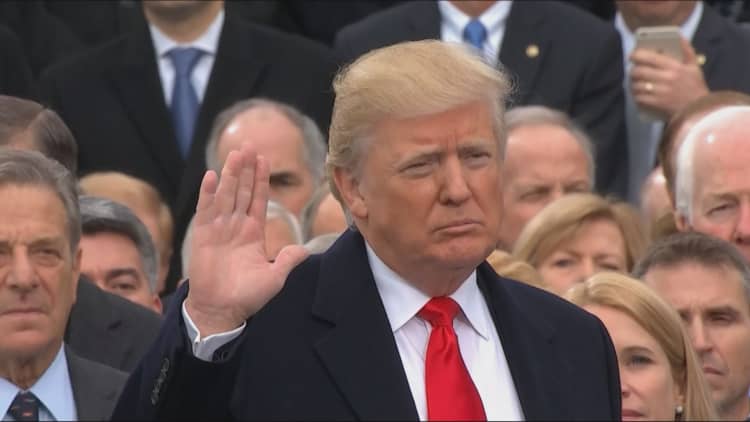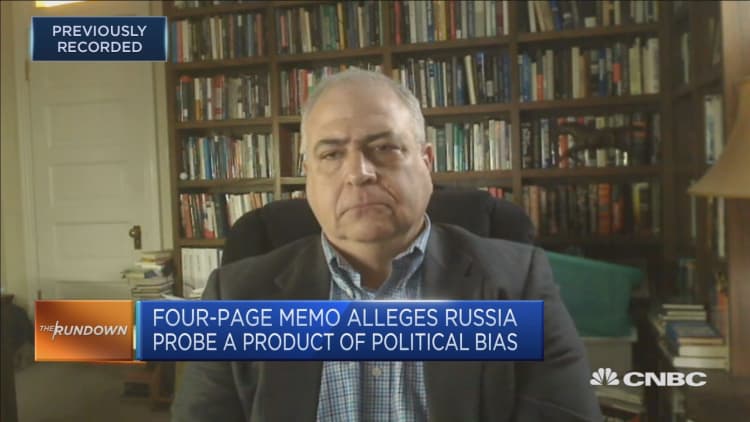The House Intelligence Committee voted Monday night to release Democrats' rebuttal to a controversial Republican memo alleging that the FBI and Department of Justice abused their power to conduct surveillance of former Trump campaign aide Carter Page.
Democrats have been anxious to formally refute the four-page GOP memo, which was written by the committee's Republican staff at the direction of Chairman Devin Nunes, R-Calif., and released Friday after President Trump signed off on it. Democrats want to release their own 10-page memo to dispute the GOP document.
With Monday's vote to publicly release the Democrats' memo, it will be sent to the White House for review, just as the Nunes memo was last week. Trump and his advisers will have five days to review it and decide whether to block its release. The president approved release of the Nunes memo over the strong objections of the FBI.

White House spokesman Raj Shah said Monday that if the committee sends the Democratic memo to the White House, officials "will consider it along the same lines" as they did the Nunes memo.
Senate Majority Letter Chuck Schumer, D-N.Y., wrote a letter to Trump on Sunday telling the president that if he does not release the Democrats' memo, it "will confirm the American people's worst fears that the release of Chairman Nunes' memo was only intended to undermine Special Counsel Bob Mueller's investigation."
"I believe it is a matter of fundamental fairness that the American people be allowed to see both sides of the argument and make their own judgments," Schumer wrote.
Mueller is investigating Russia's interference in the 2016 presidential election, possible collusion between the Trump campaign and Russians, and possible obstruction of justice by the president as he sought to limit the probe.
The House and Senate intelligence committees and the Senate Judiciary Committee have been conducting their own Russia probes, although only the Senate Intelligence Committee has managed to remain bipartisan.
The Nunes memo alleges that top law enforcement officials relied on an unsubstantiated dossier compiled by former British spy Christopher Steele to get a warrant to conduct surveillance of Page, who had served on the campaign's foreign policy advisory team.
The dossier was part of opposition research funded by the Democratic National Committee and the Hillary Clinton campaign to look into Trump's ties to Russia. The Nunes memo alleges that the FBI knew of the partisan agenda behind the dossier but did not tell the surveillance court.
Democrats say the dossier was not the only evidence that FBI and Justice Department officials used to obtain the Foreign Intelligence Surveillance Act warrant on Page. And they say that federal officials told the court that the dossier was compiled for political purposes.
"The premise of the Nunes memo is that the FBI and DOJ corruptly sought a FISA warrant on a former Trump campaign foreign policy adviser, Carter Page, and deliberately misled the court as part of a systematic abuse of the FISA process," said Rep. Adam Schiff of California, the committee's senior Democrat. "As the (Democrats) memo makes clear, none of this is true."
Schiff said the FBI had good reason to be worried about Page's contacts to Russia.
The FBI's interest in Page and his possible ties to Russia date back to 2013, when federal investigators were concerned that Page had been targeted by Russian intelligence agents for recruitment. That case came three years before the 2016 surveillance order described in the Nunes memo.
Democrats say the GOP memo contradicts its own premise that the Russia investigation began with Page and the dossier. As noted in the memo, the FBI began a counter-terrorism investigation of former Trump campaign aide George Papadopoulos in late July 2016 — about three months before federal investigators first sought the warrant on Page on October 21st. Papadopoulos pleaded guilty last fall to lying to the FBI and is cooperating with Mueller's investigation.
After the Nunes' memo was released, Trump immediately declared on Twitter that it was evidence that he had been vindicated in the Russia investigation.
"This memo totally vindicates "Trump" in probe," the president tweeted Saturday. "But the Russian Witch Hunt goes on and on."
However, House Speaker Paul Ryan, R-Wis., and some other prominent Republicans in Congress say the Nunes memo is separate from the Mueller investigation.
"Well I'm actually in a really small group of Republicans that think that this FISA process is suspect and wrong and should not have taken place, but you still have a Russia investigation even without it," said Rep. Trey Gowdy, R-S.C., on CBS's Face the Nation on Sunday.
Gowdy said there still needs to be an investigation of the June 2016 Trump Tower meeting in which Donald Trump Jr., Trump son-in-law Jared Kushner, and former Trump campaign chairman Paul Manfort met with a Russian attorney and others promising "dirt" on Hillary Clinton.
"Russia tried to interfere with our election in 2016, with or without a dossier," said Gowdy, who is a member of the House intelligence panel and helped advise staff on the writing of the GOP memo. "So you need an investigation into Russia."
Contributing: David Jackson, Kevin Johnson
Read more from USA Today:
Ex-Trump campaign adviser George Papadopoulos pleads guilty to lying to FBI about Russian contacts
The controversial Nunes memo has been released. You can read it here
Robert Mueller is 'properly operating' in probe, Justice Department says
WATCH: Mueller probe not impacted by House memo


